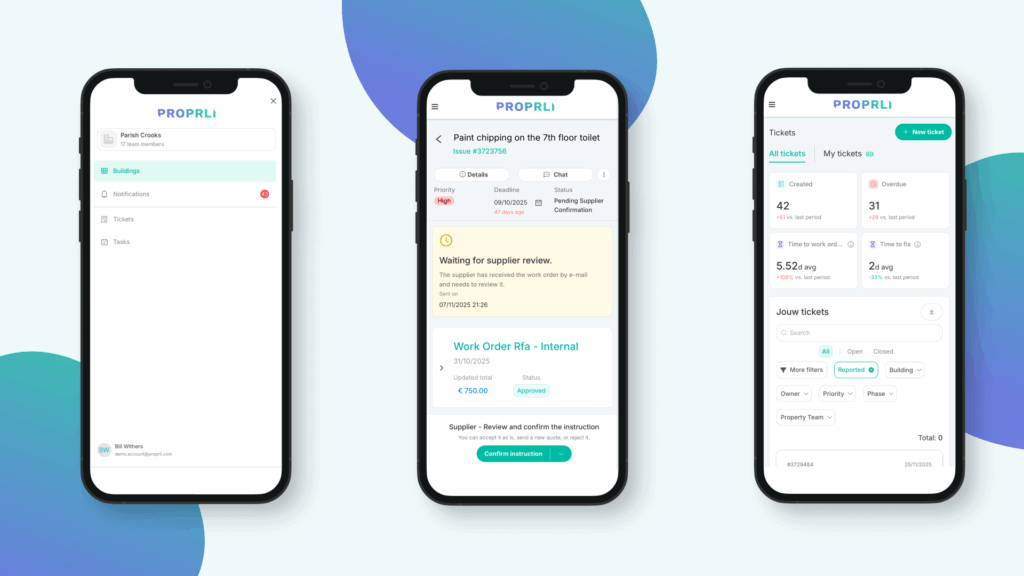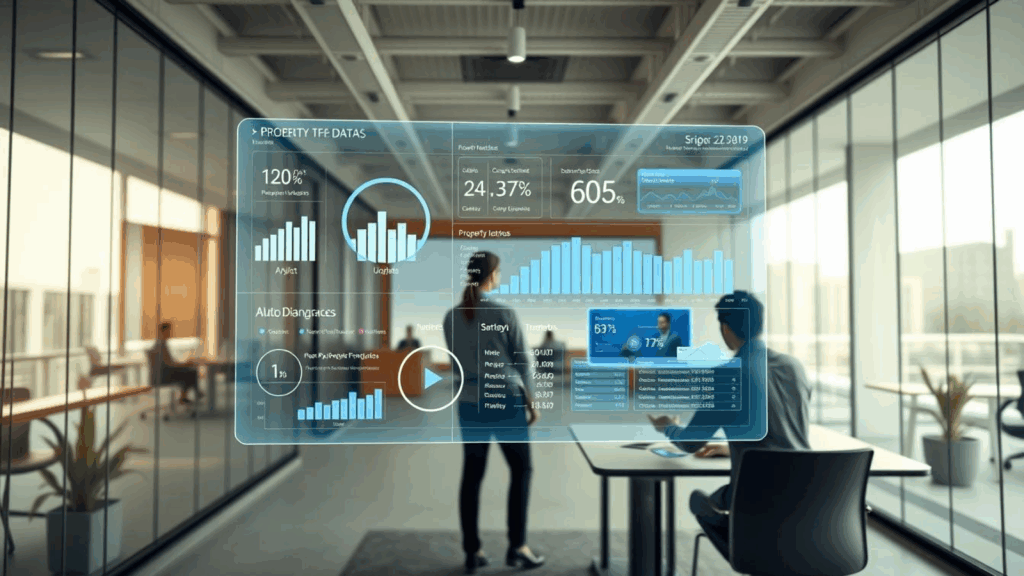The real estate world is a whirlwind of tasks and duties for property managers. They handle everything from tenant queries to property maintenance tasks and lease management. Ensuring compliance adds to the complexity. Yet, task property management software has emerged as a game-changer. It offers a way to simplify and enhance daily operations.
Property management software acts as a hub for real estate task organization and automation. It simplifies rental property task scheduling and tracks maintenance requests. This ensures a smooth property management workflow. The tool also supports real estate task tracking, helping managers stay updated and make informed decisions.
The advantages of task and workflow driven property management software go beyond just efficiency. It automates routine tasks and centralizes data. This frees up time for property managers to focus on tenant relationships and strategic planning. The software equips them to deliver outstanding service, boost tenant satisfaction, and propel property success.
Key Takeaways
- Task and workflow driven property management software streamlines daily real estate operations
- Centralized platform for real estate task organization and automation
- Simplifies rental property task scheduling and maintenance tracking
- Enables data-driven decision making and optimizes property management workflow
- Empowers property managers to provide exceptional service and drive property success
The Importance of Efficient Property Management
In today’s competitive real estate market, property management efficiency is key to success and profitability. Streamlined operations benefit both property owners and tenants, ensuring a positive experience. Property managers handle various tasks, from rent collection and maintenance to tenant communication and financial reports.
Efficient management maximizes real estate value. By adopting best practices and technology, managers can reduce costs and improve productivity. This leads to higher tenant satisfaction, retention, and stable cash flow, benefiting property owners in the long run.
- Timely rent collection and reduced delinquencies
- Proactive maintenance and repairs, minimizing property damage and tenant complaints
- Effective tenant screening and lease management, ensuring high-quality tenants and reduced turnover
- Accurate financial reporting and budgeting, enabling informed decision-making for property owners
- Seamless communication between property managers, tenants, and owners, fostering positive relationships and quick issue resolution
The table below highlights the impact of efficient property management on key performance metrics:
| Performance Metric | Traditional Management | Efficient Management |
|---|---|---|
| Rent Collection Rate | 85% | 98% |
| Average Vacancy Rate | 10% | 5% |
| Maintenance Response Time | 3-5 days | 1-2 days |
| Tenant Retention Rate | 60% | 85% |
The real estate industry’s evolution underscores the critical role of efficient property management. By adopting best practices and innovative solutions, managers can optimize real estate management. This leads to increased profitability and success for property owners, while also enhancing the tenant experience.
Challenges of Traditional Property Management Methods
Traditional property management methods, once the norm, now face numerous challenges. These issues stem from manual documentation, complex communication, and restricted data access. These obstacles hinder efficiency and growth.
Manual record-keeping is a significant challenge. Property managers are overwhelmed by paperwork, from lease agreements to maintenance requests. This method is time-consuming, error-prone, and can lead to legal and financial issues.
Communication is another major challenge. Without a unified platform, managers use emails, phone calls, and meetings. This approach can cause missed messages, delayed responses, and confusion. It negatively impacts tenant satisfaction and retention.
Data accessibility is also a significant challenge. Important information is scattered across various systems. This makes it hard for managers to access and analyze data efficiently. The lack of a unified database slows down operations and decision-making.
| Challenge | Impact |
|---|---|
| Manual documentation | Time-consuming, error-prone, and inconsistent |
| Cumbersome communication | Missed messages, delayed responses, and tenant dissatisfaction |
| Limited data accessibility | Difficulty in accessing and analyzing crucial information |
Other challenges include:
- Time-consuming rent collection and tracking
- Complex maintenance coordination and follow-up
- Fragmented data and difficulty in analyzing property performance
- Security risks associated with physical documentation
- Scalability issues as the property portfolio grows
Real estate professionals must address these challenges to streamline operations. They need to improve tenant satisfaction and drive growth in a competitive market.
Introducing Property Management Software
Property management software is a comprehensive solution for streamlining daily real estate operations. It helps overcome the challenges of traditional methods. By using this software, property managers can boost efficiency, cut down on errors, and enhance overall performance.
One major advantage of property management software is its role as a centralized data repository. This digital platform stores and organizes all property-related information in one place. It captures crucial data like lease agreements, rental payments, maintenance records, and tenant details, keeping it secure and accessible.
By moving away from physical paperwork and scattered digital files, the software ensures vital information is readily available. This approach saves time, reduces the risk of lost documents, and allows for quick data retrieval and analysis.
Another key benefit is the automation of various processes. Manual data entry is error-prone and can have significant consequences in property management. Mistakes in financial calculations, rent collections, expense tracking, and reporting can harm trust with clients or tenants.
Property management software mitigates these risks by automating data entry. It ensures accuracy and consistency in tasks like generating rent invoices, tracking payments, calculating late fees, and creating financial reports. This reduces the chance of human error.
Additionally, the software includes features for streamlined communication and collaboration. Tenants can submit maintenance requests, access documents, and receive updates through tenant portals. Property owners can view real-time financial reports and insights into their investments. Property managers can efficiently coordinate with maintenance teams and vendors, ensuring prompt issue resolution and property upkeep.
By adopting property management software, real estate professionals can access numerous benefits. These include increased efficiency, accuracy, and improved communication. The software empowers property managers to provide exceptional service, optimize portfolio performance, and drive sustainable growth in the dynamic real estate industry.
Key Features of Property Management Software
Property management software is packed with features to simplify daily tasks and boost efficiency. Key aspects include financial management automation, tenant portals, and maintenance management.
Financial management automation is a major leap forward for property managers. It automates rent collection, invoice generation, and expense tracking. This saves time and cuts down on errors. Detailed financial reports offer a clear view of the property’s financial status, aiding in informed decision-making.
Tenant portals are a vital feature of today’s property management software. They enable tenants to pay rent online, report maintenance needs, and communicate with managers easily. This empowerment of tenants lightens the load on property managers and boosts tenant happiness.
Effective maintenance management is essential for maintaining property value and ensuring tenant comfort. Property management software streamlines maintenance by allowing managers to:
- Schedule routine maintenance tasks
- Assign work orders to maintenance staff
- Track the progress of maintenance requests
- Document completed repairs and upgrades
This streamlining of maintenance management helps property managers manage repairs and preventive maintenance efficiently. It minimizes the chance of costly breakdowns and tenant complaints.
| Feature | Benefit |
|---|---|
| Financial Management Automation | Saves time, reduces errors, and provides detailed financial insights |
| Tenant Portals | Empowers tenants, reduces workload on property managers, and improves tenant satisfaction |
| Maintenance Management | Simplifies maintenance processes, preserves property value, and ensures tenant comfort |
The integration of these features makes property management software crucial for today’s property managers. It leverages automation and centralized data management to optimize daily tasks, improve tenant experience, and achieve long-term success.
Enhancing Tenant Experience with Property Management Software
In the realm of property management, tenant satisfaction is paramount. Happy tenants lead to long-term occupancy, positive reviews, and a thriving rental community. Property management software is key in enhancing the tenant experience. It offers self-service portals that empower tenants and streamline communication.
The tenant portal is a cornerstone of property management software. It provides tenants with 24/7 access to vital information like lease agreements, payment history, and maintenance requests. This centralized hub for tenant interactions significantly reduces property managers’ workload while boosting tenant satisfaction.
Self-service portals also enable tenants to submit maintenance requests electronically. Gone are the days of phone calls or emails. Tenants can now report issues through the portal, attach photos, and track their requests’ progress. This transparent communication ensures maintenance concerns are addressed promptly, enhancing tenant satisfaction.
Another vital feature of property management software is facilitating online rent payments. Tenants can securely pay their rent through the portal using various payment methods. This convenience eliminates the need for physical checks and reduces the risk of late payments, benefiting both tenants and property managers.
| Traditional Property Management | Property Management Software |
|---|---|
| Limited access to information | 24/7 access to important documents and data |
| Phone or email-based maintenance requests | Electronic maintenance request submission and tracking |
| Physical rent payments (checks) | Secure online rent payments |
| Reactive communication | Proactive and transparent communication |
By empowering tenants with self-service tools and transparent communication channels, property management software boosts tenant retention rates. When tenants feel valued and have a positive living experience, they are more likely to renew their leases and recommend the property. This leads to a stable and profitable rental portfolio for property managers.
Data-Driven Decision Making with Property Management Software
Property management software is more than a data organizer; it’s a powerful analytics tool. It helps property managers make informed decisions with real-time insights. By analyzing the data, they can spot trends, patterns, and opportunities they might have missed otherwise.
One key advantage is tracking and analyzing occupancy rates. Detailed reports on vacancy rates, lease expirations, and tenant turnover help property managers act quickly. They can reduce vacancies and increase rental income by adjusting marketing, pricing, and tenant retention strategies based on these insights.
Another critical aspect is understanding rental income patterns. The software provides detailed financial reports on rent collection, late payments, and more. Property managers can then identify areas for improvement, such as stricter rent collection policies or incentives for timely payments.
Property management software also tracks maintenance costs, vendor performance, and tenant satisfaction. Analyzing this data helps property managers make better decisions on property improvements, vendor contracts, and tenant retention. For instance, if maintenance requests for a specific issue are common, they can address it to boost tenant satisfaction and cut maintenance costs.
| Data Insight | Benefit |
|---|---|
| Occupancy Rates | Optimize marketing strategies and pricing to minimize vacancies |
| Rental Income Patterns | Identify areas for improvement in rent collection and payment policies |
| Maintenance Costs | Make informed decisions about property improvements and vendor contracts |
| Tenant Satisfaction | Implement strategies to improve tenant retention and reduce turnover |
By harnessing property management analytics, property managers can optimize performance, increase profitability, and enhance tenant experience. With the right software and a commitment to improvement, they can stay competitive in a fast-paced market.
Effective Communication and Collaboration
In the fast-paced world of property management, effective communication and collaboration are key to success. Property management software offers a centralized platform for communication. It streamlines interactions between property managers, tenants, vendors, and owners. This ensures all stakeholders are informed and can work together smoothly to address any issues.
One of the software’s main benefits is its ability to enhance tenant interaction. Through its user-friendly interface, tenants can easily submit maintenance requests, pay rent, and communicate with property managers. This accessibility boosts tenant satisfaction and fosters strong, lasting relationships between tenants and property managers.
Moreover, the software simplifies vendor management. It maintains a centralized database of vendors, allowing property managers to quickly assign work orders and track progress. This ensures all repairs and maintenance tasks are completed efficiently, minimizing downtime and keeping properties in excellent condition.
- Centralized communication channels for all stakeholders
- Streamlined tenant interaction through user-friendly interfaces
- Efficient vendor management with centralized databases and work order tracking
- Enhanced property owner collaboration through real-time data sharing and reporting
Lastly, the software improves property owner collaboration by providing real-time data and insights. Property owners gain access to detailed financial reports, occupancy rates, and maintenance records. This information enables them to make informed decisions and work closely with property managers to optimize returns.
By harnessing the power of centralized communication, tenant interaction, vendor management, and property owner collaboration, property management software revolutionizes property management. This comprehensive approach ensures all stakeholders work together towards a common goal: the success of the property and tenant satisfaction.
The Future of Property Management Software
Technology’s rapid advancement heralds a bright future for property management software. The integration of artificial intelligence (AI) promises to significantly boost efficiency and decision-making. AI algorithms will sift through vast data, offering insights and predictions that were previously unimaginable.
AI’s impact will be most pronounced in predictive analytics. Machine learning algorithms will enable software to foresee maintenance needs and spot potential problems early. This proactive stance will save time and money, while also improving the tenant experience by maintaining properties at their best.
The future also sees a focus on user-friendly interfaces. Software providers are prioritizing platforms that are intuitive and easy to use. This shift will greatly enhance the user experience, making it simpler for both property managers and tenants to interact with the software.
Seamless onboarding will also become a key area of focus. With user-friendly interfaces and thorough training, new users will quickly learn to use the software. This streamlined process will allow property managers to concentrate on their main duties, unencumbered by the complexities of software setup.
| Traditional Property Management | Future of Property Management Software |
|---|---|
| Reactive maintenance | Proactive maintenance through predictive analytics |
| Complex user interfaces | User-friendly interfaces for enhanced user experience |
| Time-consuming onboarding | Seamless onboarding for quick adoption and utilization |
The future of property management software is filled with potential for the real estate industry. With AI, predictive analytics, user-friendly interfaces, and seamless onboarding, property managers will be better equipped to manage their operations. They will make informed decisions and deliver top-notch service to tenants. As technology evolves, property management software will become even more crucial for success in real estate.
Conclusion
Property management software has transformed the real estate industry, offering numerous benefits that streamline operations and boost efficiency. It simplifies daily tasks, enhances communication, and provides deep insights through data analysis. This makes it a crucial tool for today’s real estate professionals.
The integration of technology in property management has been a game-changer. It helps property managers overcome traditional hurdles and deliver top-notch service to tenants. By automating routine tasks and improving team collaboration, it has set new benchmarks for efficiency and success in the industry.
As the real estate sector evolves, the importance of property management software in achieving success grows. By adopting these advanced tools, property managers can refine their operations, make informed decisions based on data, and aim to maximize property value and tenant satisfaction. The future of property management is deeply tied to technology. Those who embrace and utilize these tools will excel in this ever-changing field.
FAQ
What is property management software?
Property management software is a cutting-edge tool for real estate professionals. It helps manage properties, tenants, leases, maintenance, and finances efficiently. This software centralizes data, automates tasks, and offers insights for better decision-making.
How does property management software simplify financial tasks?
It automates rent collection, invoice generation, expense tracking, and financial reporting. This automation saves time and boosts financial accuracy.
What role does property management software play in maintenance management?
It streamlines maintenance by scheduling, assigning, and tracking tasks. Proactive maintenance improves tenant satisfaction and property value.
How does property management software enhance the tenant experience?
It offers tenant portals for information access, maintenance requests, and online payments. This self-service model empowers tenants and reduces property manager workload, leading to higher retention rates.
Can property management software provide insights for data-driven decision-making?
Yes, it’s a data analytics powerhouse. Managers can analyze trends like occupancy, rental income, and maintenance costs. These insights support informed decisions and strategic planning.
How does property management software improve communication and collaboration?
It centralizes communication, enabling seamless interaction with tenants, vendors, and owners. This transparency and quick issue resolution enhance operational efficiency and build strong relationships.
What does the future hold for property management software?
The future looks bright with AI and ML integration. AI could predict maintenance needs and identify issues early. The software will also become more intuitive, making it easier for everyone to use.






